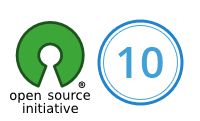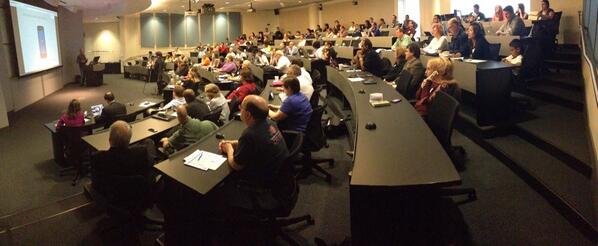 This past weekend we held the first Joomla Day Atlanta.
This past weekend we held the first Joomla Day Atlanta.
The day was a success, but it took a lot of hard work and nervous energy to get there. None of us had ever run an event before.
After seeing us do it, several people asked for advice about running their own events. Here are some tips for putting on your own open source event:
#1. Bums in seats
I've been to a lot of camps that only attracted 40 or 50 attendees. I felt sorry for the organizers who had put in so much work. This is a particular problem for events in their first year.
So, we started with three goals for the event:
- Bums in seats
- Bums in seats
- Bums in seats
If we were going to put in all the effort to organize an event, we were going to have people come.
Everything else we did stemmed from that first goal. Our low-end goal was 100 attendees and our high-end goal was 150. We ended up with about 180 registrants.
#2. Get a great venue
We had a couple of choices:
- We could choose a cheap or even free venue a long way outside of Atlanta.
- We could choose an expensive, prestigious venue in downtown Atlanta.
Going back to our original goal of bums in seats, we held a vote amongst the organizers and went for the downtown venue.
About 80% of our expenses were the venue, but we think it was worth it because it attracted more attendees. After all, who wants to come to an event held in an out-of-town parking lot? People want to be downtown where the excitement is.
Here's a photo of the Georgia Tech auditorium where we had the keynotes:

#3. Save on everything else
Approximately 80% of our costs were the venue and 15% was lunch and coffee.
We spent nothing on normal conference swag. No t-shirts, no goodie bags, no expensive name tags, no banners. Trust me, no-one wants another badly designed conference t-shirt or a bag full of paper that they have to subtly slide into the trash can later.
We didn't want to spend any money on junk that would be thrown away after the event.
#4. A conservative spending approach
I've seen several events get into financial trouble in the past. We didn't want any of our volunteers to worry about money.
So, we took the approach that the event would grow as we passed different income marks:
- $4000 - the event would have 2 tracks, because we could afford to rent two rooms
- $5500 - the event would have 3 tracks
- $7000 - the event would have 4 tracks
- $8500 - we could feed people lunch
- $9500 - we could feed people coffee and drinks through the day
We were lucky to find a venue that would allow us to work in this way. Every time we passed an income mark, we could add more features to the event.
#5. Super cheap tickets
We looked around at other open source events and saw that many were charging $70 or more. We wanted bums in seats so we knew we needed a much more affordable ticket price.
The average Joomla Day Atlanta attendee paid only $10.
If we did the event again, I'd like to make tickets free. If people want to come, there should be nothing stopping them.
#6. A wide range of sponsorship options
Our approach was that anyone who gave us money was a sponsor of sorts.
Companies get lots of sponsorships emails each month. The average company just doesn't have the budget to support many events. We decided to complete range of sponsorship levels so that everyone could give something within their budget.
All-in-all, we had 8 different levels at which people could contribute:
- $20 student ticket
- $30 regular ticket
- $50 personal sponsorship ticket
- $150 Online sponsor
- $250 Bronze sponsor
- $500 Silver sponsor
- $1000 Gold sponsor
- $2500 Platinum sponsor
#7. Take care of the sponsors
Based on our experience and stories from people we talk with, 90% of sponsors are disappointed by events. There's not enough publicity at the events, there aren't enough thank yous on social media and there's often no communication with sponsors after the payment is taken.
Please be kind to your sponsors. Give them shout-outs on social media, send them emails to show how they were featured at the event and generally try to make them feel valuable.
If you do, you'll find your sponsors willing to help you. A lot of the publicity for Joomla Day Atlanta came thanks to our sponsors.
In the end, we covered all our costs from sponsorship. Thank you, sponsors!
#8. Be pro-active with speakers
The best speakers won't find you. In fact, the opposite is true. There are plenty of people who apply to speak at every event, regardless of whether they're a good fit.
We reached out to some great speakers in the Atlanta area including Cal Evans, Sarah Gilbert, Nic Rosental and Moses Ogone.
Here's Sarah, complete with Google Glass and a whole range of mobile devices:

#9. Piggy-back on other events
We deliberately scheduled our event 2 days after the Great Wide Open in Atlanta. Several people were able to attend both events, and it helped us attract a great keynote speaker in Jason Wethersby from Mozilla.
#10. Run a beginner track all day
If you're doing your job right, many attendees will be complete newbies. Give them the option of attending a single, coherent beginner track that runs throughout the day. Trust me, it will be a lot better for them than a disjointed series of sesssions labeled as "beginner".
The end result
We had about 180 people register and about 150 people attended. Talking to other event organizers, it's very normal for between 15% and 30% of attendees to not show.
The total event budget was almost exactly $10,000. There were some other small costs such as registering as a non-profit organization.
Most importantly, it was a fun day and the feedback from attendees was very positive.
If you're thinking of holding an event and have any questions, please feel free to email us. We're happy to share our experience.
